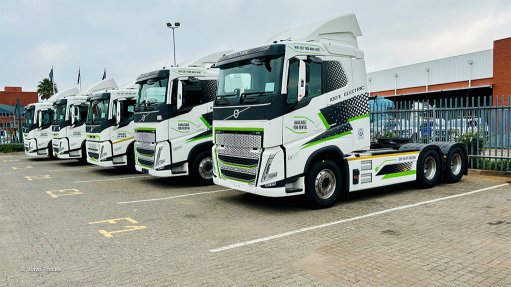Sapics conference experts explore the promise and pitfalls of supply chain digitalisation
This article has been supplied as a media statement and is not written by Creamer Media. It may be available only for a limited time on this website.
Digital transformation is at the top of most organisations’ agendas today. Supply chain digitalisation aims to leverage digital technologies to ensure that supply chains are more connected, have end-to-end visibility, are more resilient, flexible, efficient and cost effective than ever before. That’s the aim; but according to a panel of experts who explored this hot topic at the recent SAPICS Conference for supply chain professionals, there are a host of reasons why many companies are failing to achieve real value from their digital transformation initiatives.
Cobus Rossouw, Executive Vice President: Digital & Information Technology at Imperial, South Africa, facilitated this panel discussion at the 43rd annual SAPICS Conference, Africa’s leading event for the supply chain profession. The guest panellists who shared their insights were Sean Culey, who is a world-renowned, UK-based transformational change specialist and author of “Transition Point”; Yashwin Bhoola, Managing Director of Accenture, South Africa; and Paul Manikas, Senior Manufacturing Industry Architect at Microsoft in the USA.
Manikas outlined how many digital transformation initiatives fail to deliver results because they find themselves in “pilot purgatory”, a term that was coined by McKinsey. “It came out of a study that looked at digital transformation happening in manufacturing. The results were quite startling, revealing that over 80 percent of the pilot projects underway have been going on for well over a year yet less than 30 percent of the projects ever went to scale. Pilot purgatory refers the fact that there are many of these projects going on, spinning up lots of activity, but very few of them are getting to the point where they achieve scale and positively impact the business,” he explained.
One of the problems contributing to this, Manikas contends, is that companies are embarking on too many pilot projects, many of which are focussed on technology, like the Internet of Things, as opposed to the business outcome that the project should achieve. “These pilots are a great way of testing the technology and learning about whether or not they would have the right impact for you; but make sure that you are starting with an end in mind,” he urged delegates at the virtual 2021 SAPICS Conference. “As opposed to picking many pilot projects, pick one or two that can really impact the business. Then, before you start those pilots, make sure you are doing so with a plan in terms of how you are going to scale it once it's done,” he urged. “If you've done it effectively on a factory or a particular business unit, once it's achieved in that area, how are you going to extend it across the business?”
Yashwin Bhoola, South African Managing Director of global technology consulting firm Accenture, which was the principal sponsor of the 2021 SAPICS Conference, echoed Manikas’s advice to organisations aiming to reap the benefits of digital transformation projects. “Accenture’s latest research shows that only 65 percent of proofs of concept achieve scale, and about a third of these still do not deliver business value. There is a host of reasons for that. To avoid this situation, the challenge is to be really deliberate and clear about the portfolio of digital initiatives that you are driving. Make sure that you are working to solve the right problems and building the solutions with the end user of customer in mind,” he recommended. “Since supply chains are connected, it is vital in supply chain digitalisation initiatives to consider the value being created across the entire supply chain.”
Bhoola cited the example of companies that have sensors on all of their vehicles but do not have the aggregation layer and the intelligence layer to do much with them. “This means that your part of the investment in supply chain digitalisation is not really achieving benefits in the end-to-end supply chain. Similarly, there are cases of chief procurement officers who put in new procurement platforms with incredible analytics on sourcing but are unable to do vendor reconciliation, so they do not know whether the savings that they are locking in are actually being realised. It is vital to look at these investments in terms of the end-to-end supply chain value being achieved,” he stressed.
Having the right skills sets is another challenge for businesses striving to realise the value of digital transformation projects. “Many organisations are setting up analytics centres of excellence to fuel their digital transformation. I think that it is important for organisations to think about what skills they need, and whether to build them or partner with them. Undertaking a digital transformation journey without the right capabilities is a recipe for failure,” he told SAPICS Conference delegates.
World leading futurist, author and globally recognised business transformation expert Sean Culey noted that there are legacy skills in organisations that are hindering digital transformation strategies. “Many people in our organisations still have analogue mindsets in the digital world. We believed that our experience, that we have built up over the last 20 to 30 years gives us credibility and value moving forward. In many cases, however, it is now being proved quite redundant. Leadership and culture can also work against businesses working towards digital transformation,” he said.
Like Bhoola, Culey stressed the need for organisations to have a long-term vision of what they are aiming to achieve with all the digital tools at their disposal. “We need to be clear about what our customers value, too. When going into the innovation labs or looking at pilots, organisations must view the projects with clarity around how every initiative aligns to the delivery of customer value,” he asserted.
The 2022 SAPICS Conference is planned for 12 to 15 June 2022, at Century City, Cape Town.
Comments
Press Office
Announcements
What's On
Subscribe to improve your user experience...
Option 1 (equivalent of R125 a month):
Receive a weekly copy of Creamer Media's Engineering News & Mining Weekly magazine
(print copy for those in South Africa and e-magazine for those outside of South Africa)
Receive daily email newsletters
Access to full search results
Access archive of magazine back copies
Access to Projects in Progress
Access to ONE Research Report of your choice in PDF format
Option 2 (equivalent of R375 a month):
All benefits from Option 1
PLUS
Access to Creamer Media's Research Channel Africa for ALL Research Reports, in PDF format, on various industrial and mining sectors
including Electricity; Water; Energy Transition; Hydrogen; Roads, Rail and Ports; Coal; Gold; Platinum; Battery Metals; etc.
Already a subscriber?
Forgotten your password?
Receive weekly copy of Creamer Media's Engineering News & Mining Weekly magazine (print copy for those in South Africa and e-magazine for those outside of South Africa)
➕
Recieve daily email newsletters
➕
Access to full search results
➕
Access archive of magazine back copies
➕
Access to Projects in Progress
➕
Access to ONE Research Report of your choice in PDF format
RESEARCH CHANNEL AFRICA
R4500 (equivalent of R375 a month)
SUBSCRIBEAll benefits from Option 1
➕
Access to Creamer Media's Research Channel Africa for ALL Research Reports on various industrial and mining sectors, in PDF format, including on:
Electricity
➕
Water
➕
Energy Transition
➕
Hydrogen
➕
Roads, Rail and Ports
➕
Coal
➕
Gold
➕
Platinum
➕
Battery Metals
➕
etc.
Receive all benefits from Option 1 or Option 2 delivered to numerous people at your company
➕
Multiple User names and Passwords for simultaneous log-ins
➕
Intranet integration access to all in your organisation


















